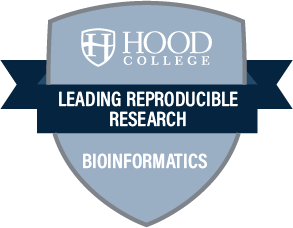Badge Overview
 Leading Reproducible Research
Leading Reproducible Research
Published Public {} Badge Class Data
Leading Reproducible Research

Issued by Hood College
Badge Description
The Leading Reproducible Research badge is based on the tenants of the "reproducible research" movement and teaches the fundamentals of experimental design, research ethics and communication to foster the ability to coordinate multifaceted research collaborations between scientists with backgrounds in biology, computer science and biostatistics. Using examples from classical literature and the concepts extolled by philosophers from around the world, learners explore alternative modes of leadership based on effective communication between individuals from different backgrounds. Key topics related to reproducible scientific computing as well as leadership principles needed to lead interdisciplinary teams are introduced. The five core areas of computational reproducibility are emphasized: literate programming, code version control and sharing, compute environment control, persistent data sharing and documentation. Emphasized leadership principles include communication, scientific ethics, influence, managing up and across, consensus building and fostering resilience.
leadership styles
Python
Reproducible Computing
Version Control
Code Packages
Scientific Ethics
Test Driven Development
Workflow Management Systems
R
Badge Criteria
This FOUNDATIONAL level badge is equivalent to a 3-credit, master's-level course. A final grade of B or better is required to earn this badge.
Aligned Outcomes
-
Internal
Core Competencies
https://www.hood.edu/offices-services/institutional-assessment/institutional-learning-outcomesGSO_CommCommunication
The badge earner will communicate clearly and effectively in oral, written and/or visual formats, consistent with the standards of their discipline.
-
Internal
Core Competencies
https://www.hood.edu/offices-services/institutional-assessment/institutional-learning-outcomesGSO_ResResearch
The badge earner will identify and explore relevant questions and/or problems by accessing, evaluating, applying and/or conducting research using discipline-specific strategies.
-
Internal
Core Competencies
https://www.hood.edu/offices-services/institutional-assessment/institutional-learning-outcomesGSO_CriReasCritical Reasoning
The badge earner will approach content and tasks with a critical awareness, framed by knowledge and skills appropriate to their discipline.
-
Internal
Core Competencies
https://www.hood.edu/offices-services/institutional-assessment/institutional-learning-outcomesGSO_ProfProfessionalism
The badge earner will engage in legal, ethical and professional behaviors consistent with their discipline, including leadership, teamwork and/or other responsibilities to key stakeholders.
-
Internal
Core Competencies
https://www.hood.edu/offices-services/institutional-assessment/institutional-learning-outcomesGSO_ProbSolvProblem Solving
The badge earner will apply advanced disciplinary content knowledge and strategies to understand and address problems and questions relevant to their discipline and to which they have not previously been introduced.
-
Internal
Core Competencies
https://www.hood.edu/offices-services/institutional-assessment/institutional-learning-outcomesGSO_DivDiversity
The badge earner will recognize and engage diverse ideas, perspectives and/or traditions that inform their discipline, profession and graduate experience.
